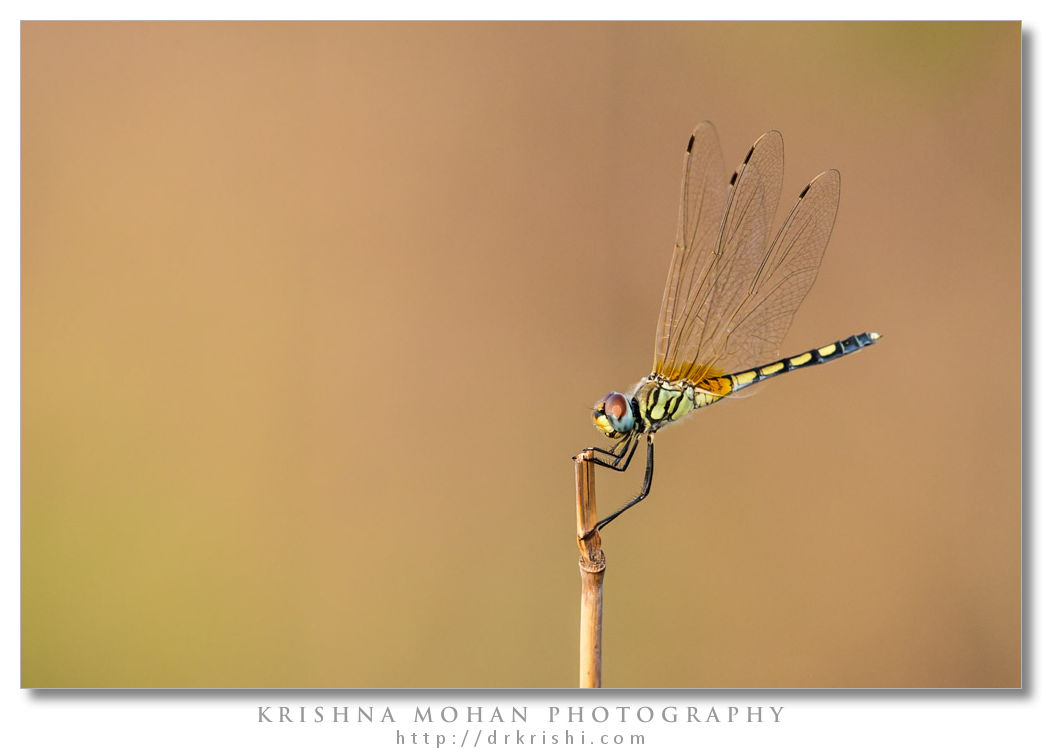
The Setting Sun lay like a spent lover, upon the fiery breast of a molten sky, the fading rays magically transforming the miniature ‘savannah’ around me, into a sea of gold. Transfixed, I stood admiring this curious alchemy, taking some respite from the merciless heat of particularly sweltering day spent in the wilderness, when, perhance, I came upon this dainty Long Legged Marsh Glider (Trithemis pallidinervis), precariously perched upon a grass blade. Long-legged Marsh Gliders are usually encountered around ponds, lakes and rivers, being at home in wetlands and are fascinating, graceful insects. While at rest during the hotter parts of the day, they tend to raise their long abdomen upwards, with the tip pointing at the sun, assuming a curious stance, much like a gymnast doing a handstand. This Posture is called an obelisk and helps avoid overheating.

Despite using a gear which is primarily meant for photographing birds, same setup can also be used to capture close-ups and that was precisely what I did. I was using my Canon EF 300mm f/2.8L II IS USM with Canon EF 1.4x III Extender on Canon EOS 5D Mark III Camera. Owing in part to the distance between us, the dragonfly continued to perch, undisturbed. Trying to focus on a tiny subject in the fast dwindling light of breezy evening, using a heavy lens is not an easy task. I utilized 1/650sec shutter speed and f/9.0 aperture to get a sharper picture with a better depth of field.

Identification Characteristics –
Trithemis pallidinervis is a medium sized, yellow-brown dragonfly with long spidery legs. Males have yellow to pale brown faces in front and are iridescent purple above. The large compound eyes are reddish brown above, brownish on the sides and bluish grey below. The thorax is olivaceous-brown above, with a dark brown triangle, bright yellowish brown below, with three black stripes on each side. Legs are black, long and spidery. The basal half of the femora of the first pair of legs are bright yellow. Wings are transparent with reddish venation. The forewings have amber colored basal markings. The wings have a golden sheen when viewed from certain angle. Wing spot is black with creamy white ends. Abdomen is a bright yellow with black median and lateral stripes. These stripes are confluent at the end of each abdominal segment, enclosing a wedge shaped yellow spot.

Females largely resemble males, with the wings tinted yellow or reddish brown, with the base of the abdomen being broadly black.

The species is partial to the marshlands and weedy ponds where it breeds, preferring to perch on tall aquatic weeds or at bare ends of shrubs. The long legs are very noticeable at this time.
Primarily on the wing from October till December, while occuring in smaller numbers during other months, the species is reasonably tolerant of humans and fairly easy to approach and photograph.

Distribution range includes China, Indonesia, India, Cambodia, Sri Lanka, Myanmar, Malaysia, Philippines, Peninsular Malaysia, Thailand and Taiwan.
Thanks to Javed Ahmed for helping me to write this blog.


????????? ? ???? ??????????? ??? ????????? ???? ???????????? ???? ??? 🙂 ????? ?????? ?????????? ????????
You are doing a lot of macro photography. Very good job and photos are awesome!